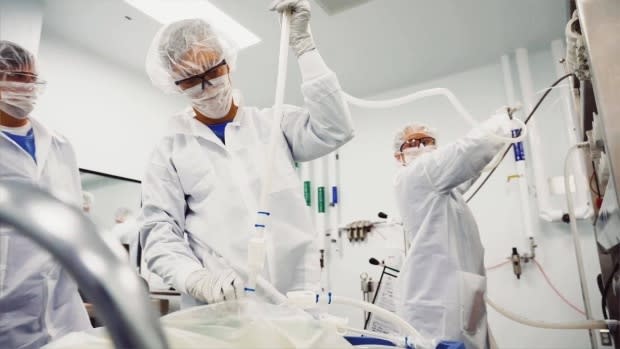'We're all hoping it won't get messy': Canadian vaccine makers weigh in on global tug-of-war
With dozens of COVID-19 vaccine candidates in development around the world, a massive challenge looms on the horizon: deciding who gets access to a successful vaccine first, and whether countries can produce enough for everyone.
Most countries, including Canada, are banking on global co-operation. But there are already signs that political interference may complicate where the early candidates will be produced, and where the first orders will be sent. In the past, Canada has relied heavily on other countries to help manufacture its vaccines.
South of the border, through a project dubbed Operation Warpspeed, the United States is investing heavily in the race to develop and manufacture a vaccine for its own citizens.
Just this week, the White House invested $1.2 billion US to secure 300 potential doses of a vaccine being developed in the U.K.. And Moderna, an American biotech company, made headlines when it announced its vaccine produced protective antibodies in a small group of healthy volunteers."We think we're going to have some very good results coming out very quickly," U.S. President Donald Trump told reporters at the White House this week. "And they'll all be [made] here in the U.S.A."
Finding a vaccine is just the beginning
Currently, Canada's most promising vaccine candidate is in collaboration with a Chinese company, CanSino Biologics. A research team at Dalhousie University is now working with the Chinese manufacturer to run clinical trials here.
The federal government has also invested $192 million to help create a made-in-Canada vaccine. Two of the companies receiving the funding, Medicago and VIDO-InterVac, are aiming to start human trials by the fall.
But even if a Canadian vaccine is successful, producing enough for all Canadians isn't a simple task.
Based in Quebec, Medicago has one of the largest production capacities in the country and says it's committed to providing vaccines for all Canadians if it's successful. But the company's main facility is across the U.S. border, which could create complications.
"There is some production capability in Quebec City, but we have a five times larger facility in the United States," said Medicago's chief medical officer, Brian Ward, in an interview with Wendy Mesley for The Weekly.
He says it's possible the U.S. could try to claim any vaccines Medicago produces in its U.S. facility for American citizens first.
"There would have to be a process of negotiation," he said.

Production could be even more complicated for vaccine candidates created by universities or public researchers, who often rely on other countries to help manufacture their products.
"Our current [manufacturing] capacity is quite limited," said Volker Gerdts, CEO and director of VIDO-InterVac at the University of Saskatchewan.
Gerdts says he's been speaking to the federal government for some time about the need to beef up its production capacity. And while VIDO-InterVac did recently get the money to build another facility, it won't be ready until 2023.
The government has also invested in the National Research Council's biomanufacturing facility in Montreal. But even that facility only aims to produce approximately 70,000 to 100,00 COVID-19 vaccine doses per month, the Department of Innovation, Science and Economic Development told CBC News in an email.
'There will be political interference'
It's impossible to know which, if any, vaccine will be effective. But the United States appears likely to have early access to one, given how much it has invested in the top candidates, and how much production capacity it has. And if the government decides to vaccinate its entire population first, people in other countries, including Canada, could end up waiting in line.
It has happened before.
During the swine flu outbreak in 1976, when experts feared the world was on the brink of a massive pandemic, the U.S. decided to vaccinate its entire population before it would allow vaccine producers to export their products to Canada.
"[Like during the swine flu], there will be political involvement and interference in the movement of vaccines as they become available, " said Ward of Medicago.
And there are signs the international tug-of-war has already begun.
Last week, Paul Hudson, the CEO of the France-based pharmaceuticals giant Sanofi, told Bloomberg News: "The U.S. government has the right to the largest pre-order because it's invested in taking the [financial] risk."
The French government was quick to respond, saying that it would be "unacceptable" for the French company to give the United States first access.
Hudson later apologized, saying it is vital that any coronavirus vaccine reach all regions.
Expect 'striking inequalities'
Both Gerdts and Ward say they're optimistic about Canada's global position, and confident the government is working to ensure Canadians get access to a vaccine.
"I think it's good that we're seeing in Canada a number of technologies moving rapidly forward to ensure that there will be enough for Canadians," said Gerdts.
According to the Public Health Agency of Canada, there are "at least 30" organizations pursuing COVID-19 vaccines across the country.
"Through close monitoring of the vaccine development pipeline, both domestically and internationally, the Government of Canada will work quickly to negotiate purchase agreements with vaccine manufacturer(s) to secure supply for all Canadians as soon as it is feasible," the Public Health Agency of Canada told CBC's The Weekly in an email.
"The soonest that [a vaccine] could be broadly available in Canada could be sometime in mid-2021, but this is an estimate based on what we know now and would depend on availability of supply."
Ward says he worries most about others— particularly, low and middle-income countries.
"There will be striking inequalities between those who have vaccines and those who don't initially," he said. "I think that it's on all of us to try to make sure that there is some degree of equity in the distribution." "We're pretty lucky here."
